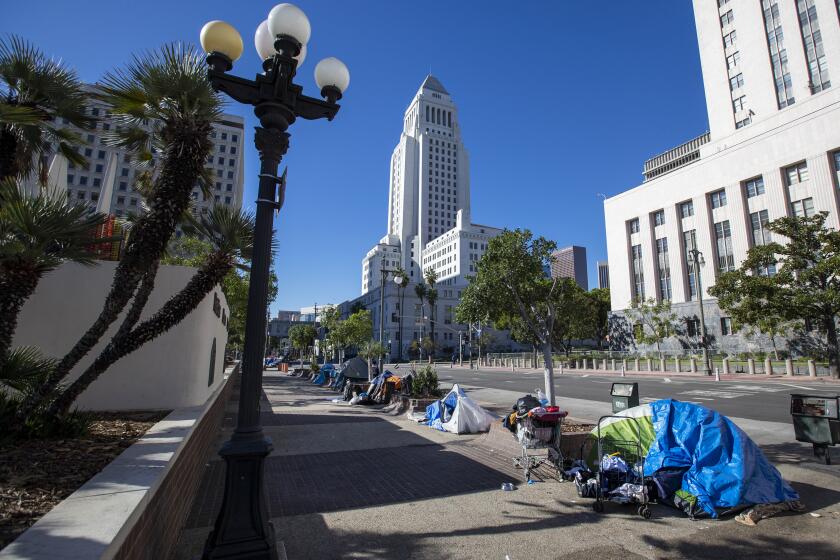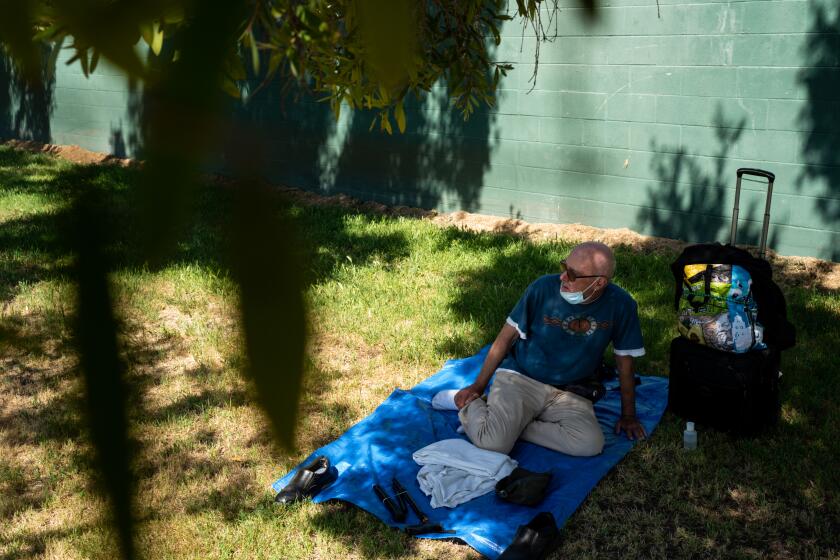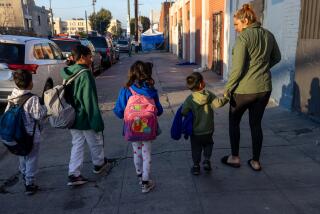L.A. is entitled to federal aid to put homeless people in hotels. It hasn’t asked for any yet
- Share via
The city of Los Angeles has not received millions of dollars in federal aid it may be owed for housing homeless people in hotels during the COVID-19 pandemic because, nearly a year into the crisis, Mayor Eric Garcetti’s administration hasn’t asked for the money yet.
Local, state and federal officials say the city hasn’t requested reimbursement from the Federal Emergency Management Agency for portions of the estimated $59 million it has spent on Project Roomkey, which has been sheltering homeless people in hotel rooms since shortly after the pandemic began last year. The city has sharply scaled back the hotel program in recent months, leading advocates and lawyers for the homeless to say the Garcetti administration is showing a lack of political will to protect some of L.A.’s most vulnerable residents.
“There is federal money on the table — the literal FEMA response the mayor has been begging for, and yet the city has found excuse after excuse not to take advantage of it,” said Legal Aid Foundation of Los Angeles attorney Shayla Myers.
“If this is true, it is really disturbing and inexcusable,” said Mary Leslie, president of the Los Angeles Business Council, who has urged the city to expand the hotel program.
“This is costing the most vulnerable people their lives.”
Garcetti Deputy Communications Director Alex Comisar said Wednesday that there is “not one iota of funding” that is holding up the city’s process for securing hotel rooms and the city continues to front money for that effort.
“Any unnecessary delays in this process are unacceptable, and Mayor Garcetti expects these reimbursement requests to be submitted by the end of this month,” Comisar said.
Activists, business leaders and elected officials have spent weeks pressuring Garcetti to rent thousands more hotel rooms for people living on the streets through newly announced federal aid that fully reimburses cities for the rooms. Under the Trump administration, the federal government reimbursed 75% of the costs; the Biden administration has raised that to 100%.
An executive order signed by President Biden last week changed federal funding rules in a way that could potentially lift thousands of homeless Angelenos off the streets as the coronavirus continues to rage.
Garcetti has expressed enthusiasm for the federal help, but also blamed a lack of hotel participation as the reason why the program hasn’t expanded. He’s also questioned whether homeless service providers have enough staff to help those living at the hotels.
Most frequently, though, he’s mentioned a cash flow problem. City Hall is facing a financial crisis, and it needs dollars to spend before the money can be reimbursed by the federal government. It can take years to recoup those funds, according to the mayor.
City officials cited a lack of staff for the failure to apply for reimbursement. Before, one city staffer was assigned to work on FEMA reimbursement applications, city officials said. Now three are processing requests.
“Essentially our billing department needs more assistance to get the money back,” City Administrative Officer Rich Llewellyn told City Council members at a Budget and Finance Committee meeting last week.
Shortly after his inauguration, President Biden signed an executive order directing FEMA to reimburse cities and counties 100% for renting rooms for homeless people at risk of contracting COVID-19 through September 2021.
In response, Garcetti pulled $75 million from a city fund to keep open about 1,200 rooms that the city already had rented and was slated to close. His office is also trying to rent 200 more rooms at four motels.
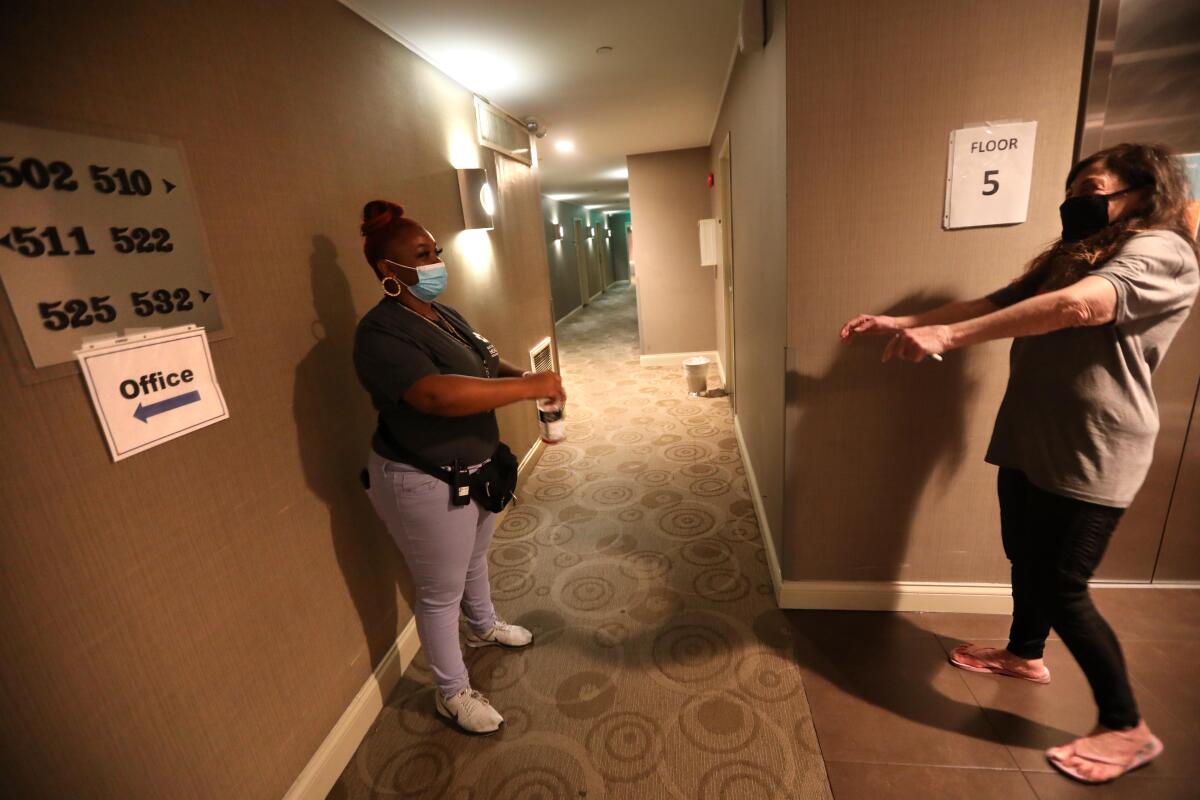
At the peak of Project Roomkey last summer, the city and county had 3,774 rooms under lease.
Those rooms have been a lifeline for Angelenos on the street, providing a safe space during the health crisis and help in the form of meals and services. Nearly 7,000 homeless people in Los Angeles have contracted the virus, and large shelters that house many people on a nightly basis have been a hub for large outbreaks.
County officials requested nearly $80 million from FEMA for hotel rooms. Some $40 million was made available as part of an expedited program that allows municipalities to receive 50% of the funds upfront.
The county has sought $400 million from FEMA for its broader pandemic response. As of this week it has received about $119 million in reimbursements from FEMA, including $12.4 million for Project Roomkey.
In contrast, the city has lagged behind the county when it comes to getting money back. City officials have submitted about $100 million for reimbursement of money spent on COVID testing, a surge hospital at the L.A. Convention Center, a meal program for elderly Angelenos, and more. About $29 million has come back, city officials said. None of the reimbursement requests have been for hotel rooms.
On homelessness, the new Biden administration is offering to spend more on the problem — but it will need buy-in from Congress.
Assistant City Administrative Officer Patty Huber told The Times that the city will soon ask FEMA for about $14.5 million for what it spent on Project Roomkey from the beginning of the pandemic through Aug. 15. She added that the City had prioritized reimbursement requests that were bigger and in many cases simpler to complete.
Llewellyn, the administrative officer, said FEMA doesn’t accept estimates, so the city is required to detail the number of hours of overtime worked by Fire Department staff, for instance.
“It’s a kind of a skill set that I can’t just take anybody and plop them into this,” Huber told the Budget and Finance Committee.
During the hearing, City Councilman Bob Blumenfield said he wants the city to be “amping up our FEMA-eligible expenses,” adding that the process “feels frustratingly slow.”
“Every day that goes by that we’re not taking full advantage of that FEMA money is a lost opportunity,” Blumenfield said.
Told that city officials are blaming staffing issues, Los Angeles Business Council’s Leslie offered to help.
“If it’s really a matter of filling out paperwork, the LABC is perfectly willing to organize an army of volunteers to go down to City Hall,” Leslie said.
Frustrated by the city’s inability to rent more hotel rooms, Los Angeles City Council President Nury Martinez and Councilman Paul Krekorian asked budget analysts to examine how Project Roomkey could be expanded — and what sources of funding could be used to make that happen.
The pair wants the city to request from FEMA a $150-million advance of funds to cover the rental of 10,000 hotel rooms through September, the month the 100% federal reimbursement expires. This covers an estimated 40% of the costs for these rooms.
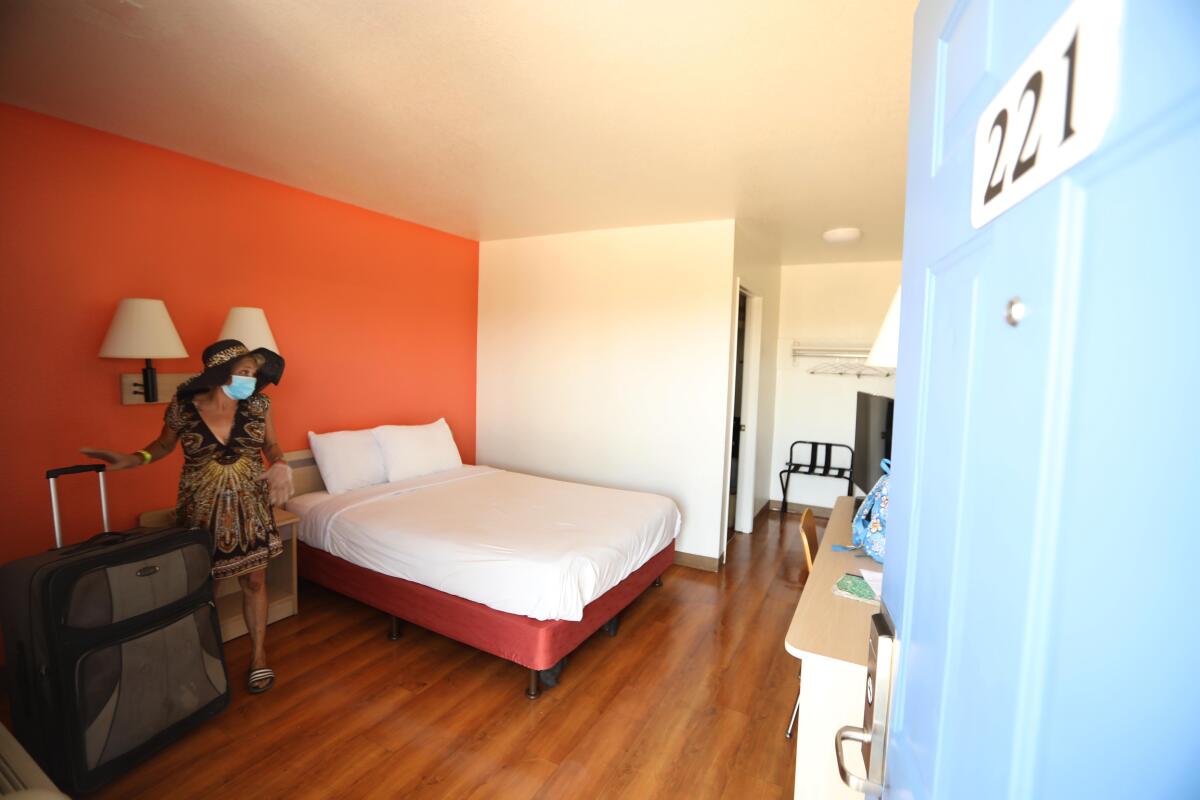
FEMA spokesman Robert Barker told The Times that a request of this size, while unusual, is feasible provided that city officials explain why they couldn’t cover the costs and show why the hotel rooms are a medical necessity. He said how quickly they get the money depends on how fast and thoroughly they complete the paperwork and justify why the money is needed upfront.
“With an expedited Public Assistance Project, you can get 50% of the funds upfront,” Barker said.
Martinez said she was glad to see Garcetti put forward $75 million to spend on hotels but thinks the city could do more.
“There’s really nothing more frustrating than to not be able to take advantage of an opportunity like this,” Martinez said.
Garcetti said last week that he would support Martinez’s efforts to advance the money.
L.A. County is falling behind on its goal of quickly moving 15,000 homeless people into hotel rooms amid the COVID-19 pandemic. Activists want more.
Martinez and Garcetti have been targeted at their homes and at public events by activists who want them to compel hotel owners to rent their rooms to the city so it can shelter homeless people. So far city and county officials have sought out hotels that were willing to rent their rooms rather than force hotels to participate, and as a result fell far short of their goal to rent 15,000 rooms for homeless Angelenos over 65 or at risk of dying from the virus.
Last summer the city investigated why no hotels that had received taxpayer assistance or were built on sites currently or formerly owned by the city or its former redevelopment agency participated in Project Roomkey.
They found a host of concerns, including one downtown hotel that was worried about how participating in Project Roomkey would affect its brand. They also found that the county had contacted 850 hotels, but at its peak, just under 40 hotels were participating in the program.
Garcetti has the legal right to commandeer hotel rooms as “needed for the protection of life and property of the people,” according to a report issued by City Atty. Mike Feuer’s office.
Pete Hillan, representative for the California Hotel and Lodging Assoc., which represents 6,000 hotels statewide, said commandeering hotels sets a bad precedent and is unnecessary. “We continue to work with the city and county to ensure that there’s enough space for those who need it,” Hillan said.
Martinez told The Times she would be open to commandeering rooms if hotels weren’t willing to open their doors, but she didn’t want to get into a situation in which protracted litigation prevented people from getting off the street.
Krekorian said that he and his colleagues understood the need to act fast but first had to gather more facts, which would help shape what they do next.
“We need to work with all deliberate speed, but we also have to make sure that we do it in a way that is going to work and isn’t going to put the city in a terrible situation of not getting its expenses reimbursed, or stumbling and not doing it properly.”
More to Read
Sign up for Essential California
The most important California stories and recommendations in your inbox every morning.
You may occasionally receive promotional content from the Los Angeles Times.

